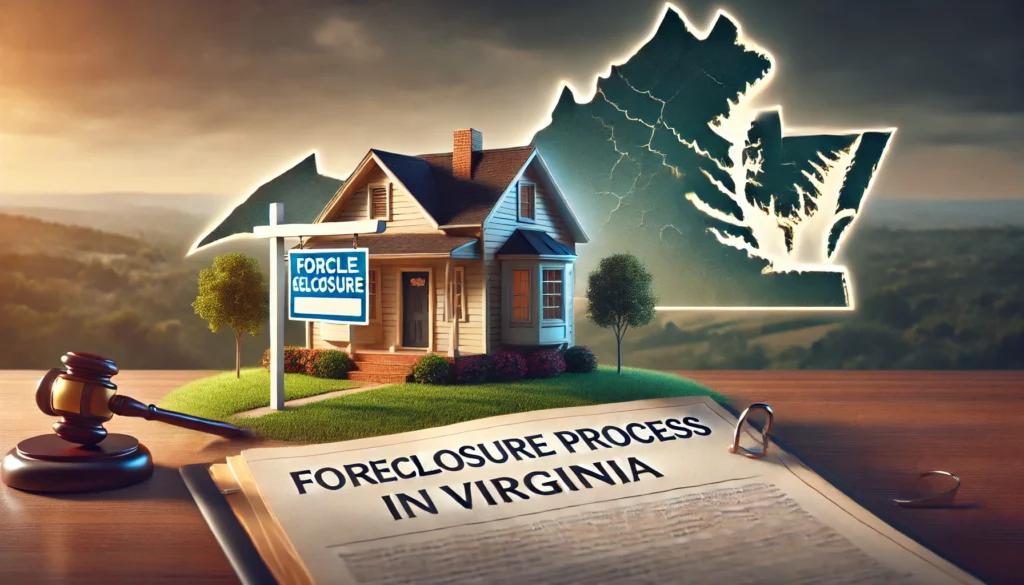Understanding the Foreclosure Process In Virginia

Introduction
If you’re searching for information on “Understanding the Foreclosure Process in Virginia,” you’re likely facing a difficult situation. You may be behind on mortgage payments, have received foreclosure notices, or are worried that the bank could take your home soon. You’re probably feeling overwhelmed, stressed, and uncertain about what steps you need to take to protect your home and your future.
At this point, you’re looking for clarity. You want to understand the foreclosure process in Virginia, how much time you have before things get worse, and what options are available to you. You need answers to critical questions, like whether you can stop the foreclosure process, what alternatives exist, and how selling your home could help you avoid further financial hardship.
More importantly, you might be wondering if selling your home to a trusted real estate investor is a viable solution. After all, this could help you avoid the public auction and get a fair, quick offer for your home without going through a long, drawn-out foreclosure battle. This blog will guide you through Virginia’s foreclosure process, break down the steps, and give you insight into why selling your home for cash may be the best option to protect your financial future.
Understanding the Foreclosure Process in Virginia
If you’re behind on mortgage payments in Virginia, foreclosure could feel like an impending storm. Foreclosure is a legal process that lenders use to take possession of your property when you fail to make timely payments on your loan. In Virginia, the process can be fast, and it may be difficult to avoid once it begins. However, understanding the steps of foreclosure can give you the power to act before it’s too late.
The Foreclosure Timeline in Virginia: How Long Do You Have?
The first thing you need to know about foreclosure in Virginia is that the entire process can move quickly. It typically takes between 120 to 180 days from the time you miss your first mortgage payment to the time your house is auctioned off. However, this timeline can vary depending on your specific situation, the lender’s practices, and the court’s involvement.
- Missed Payments: Your lender typically won’t start foreclosure proceedings immediately after one missed payment. However, if your mortgage payments are 90 days overdue, your lender may begin the foreclosure process.
- Notice of Default: After about 90 days of missed payments, your lender will issue a Notice of Default, informing you that you are in default on your loan. This is your warning that foreclosure could be imminent.
- Notice of Sale: If you don’t resolve the situation by paying what’s owed, the lender will file a Notice of Sale, which is a public notice stating that your home will be sold at auction.
- Foreclosure Auction: After the Notice of Sale is issued, a public auction will be scheduled. You will have a final chance to resolve the debt before your home is sold to the highest bidder.
At this stage, it’s critical to understand that time is running out. You have limited options to stop foreclosure in Virginia, so knowing where you stand in the timeline can help you determine the most effective strategy.
If you’re looking for additional strategies to avoid foreclosure in Virginia, don’t hesitate to check out our comprehensive cluster post on How to Avoid Foreclosure in Virginia, where we break down more actionable steps and legal options that may apply to your situation.
How Does Virginia’s Non-Judicial Foreclosure Process Work?
In Virginia, the foreclosure process is non-judicial, meaning that the lender does not have to go through the court system to foreclose on a property. This is one reason why foreclosures in Virginia tend to move quickly.
The non-judicial foreclosure process is governed by Virginia Code Section 55-59, which allows the lender to sell the home without filing a lawsuit. Here’s how it works:
- Notice of Default: As mentioned earlier, the lender sends you a Notice of Default after you’ve missed several payments. This notice typically provides a 30-day window to cure the default, meaning you’ll need to catch up on your payments in full.
- Trustee’s Sale: After the 30-day period, the lender can initiate a Trustee’s Sale. They will set a date for the foreclosure auction, which is typically held in the county where the property is located.
- The Auction: The home is sold at a public auction to the highest bidder. The auction is open to the public, and the lender is often the primary bidder. If no one bids enough to cover the remaining loan balance, the property may be taken back by the lender.
For many homeowners, this process can feel like an avalanche of uncertainty. You might be asking: Can I stop this? How do I fight back?
This is where knowing your options and acting quickly can make a significant difference. If you’re in this situation, you may want to consider selling your house for cash to avoid going through the auction. It can offer you an escape route from foreclosure while giving you the chance to walk away with some cash instead of losing your home.
What Are Your Options to Avoid Foreclosure in Virginia?
If you’re facing foreclosure, you have several options to consider in Virginia. Some of these options might allow you to keep your home, while others may be a way to minimize the damage and avoid a public auction.
1. Loan Modification
One of the most common ways to stop foreclosure is by modifying your loan. A loan modification involves negotiating with your lender to change the terms of your mortgage. This could involve reducing your interest rate, extending the length of the loan, or temporarily deferring payments.
While this may sound appealing, it’s important to know that loan modifications are not always approved. In fact, many homeowners who apply for loan modifications don’t get the approval they need. Additionally, loan modification applications can take months to process, meaning you may end up deeper into default before a decision is made.
Learn more about loan modifications from the Consumer Financial Protection Bureau (CFPB).
2. Refinance Your Loan
Another option to consider is refinancing your mortgage. This option involves taking out a new loan to pay off your current mortgage. If you have good credit and can qualify for a lower interest rate, refinancing can help reduce your monthly payments.
However, refinancing isn’t always possible for homeowners in foreclosure. If you’re already behind on your mortgage payments, you may have difficulty qualifying for a new loan.
Get more details about mortgage refinancing at NerdWallet’s refinancing guide.
3. Selling Your Home
Selling your home is one of the fastest ways to avoid foreclosure. If you sell your home before the auction takes place, you may be able to keep any equity and avoid the blemish of a foreclosure on your credit history.
For homeowners who need to sell quickly, working with a cash home buyer is a viable solution. Cash buyers can close in a matter of days, allowing you to sell your property fast and avoid foreclosure altogether. If you’re facing foreclosure and need to sell your house, this option could be worth considering.
Want to learn how you can sell your house for cash to avoid foreclosure? Visit our page on How To Stop The Bank From Foreclosing On Your House for more details on how this process works.
4. Bankruptcy
In some cases, filing for bankruptcy may temporarily halt the foreclosure process. Chapter 13 bankruptcy, for example, can allow you to catch up on overdue payments by restructuring your debt. However, filing for bankruptcy comes with significant long-term consequences, and it’s not a guaranteed solution to keeping your home.
While it may delay foreclosure, it doesn’t eliminate your mortgage debt, and you may still lose your home in the long run if you can’t keep up with the new payment plan.
5. Deed in Lieu of Foreclosure
A deed in lieu of foreclosure is an option where you voluntarily transfer ownership of your property to the lender in exchange for the cancellation of your mortgage debt. This process can be less damaging than foreclosure, as it doesn’t involve an auction. However, you may still have to leave your home, and there may be tax implications.
Conclusion: Why Sell to Local Home Buyer?
When facing foreclosure in Virginia, time is critical. While you do have a few options to avoid foreclosure, many homeowners find that selling their home for cash to a trusted investor like Local Home Buyer is the fastest and least stressful solution.
Selling to Local Home Buyer offers you a quick escape from the uncertainty of the foreclosure process. With cash in hand, you can avoid the auction, preserve your credit, and move forward with a fresh start. Plus, working with us means you don’t have to worry about repairs, agent fees, or long waiting periods — we buy homes as-is and can close on your timeline.
If you’re looking for a way to avoid foreclosure and take control of your future, selling to Local Home Buyer is a smart option. We specialize in helping homeowners just like you, offering a simple, straightforward, and stress-free process.
Don’t wait until it’s too late. Contact us today to get a fair cash offer and avoid the damaging effects of foreclosure. Let Local Home Buyer help you get the peace of mind you deserve and move on with your life.
